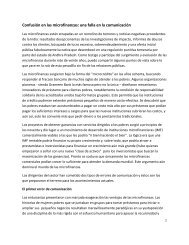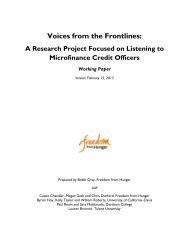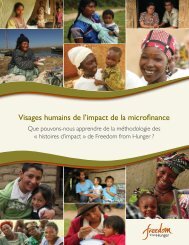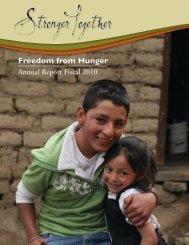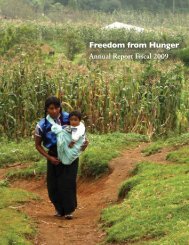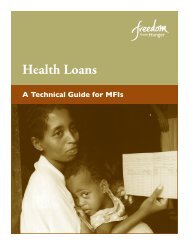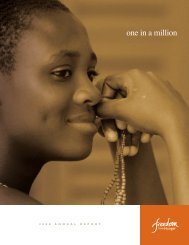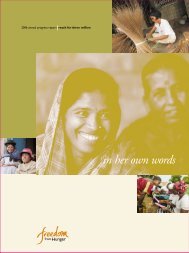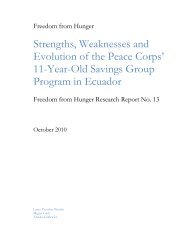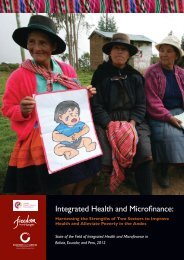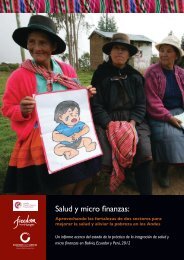history of meals for millions, soy, and freedom from ... - SoyInfo Center
history of meals for millions, soy, and freedom from ... - SoyInfo Center
history of meals for millions, soy, and freedom from ... - SoyInfo Center
Create successful ePaper yourself
Turn your PDF publications into a flip-book with our unique Google optimized e-Paper software.
1994 total estimated population was 415,000); located 50<br />
miles / 80 km west <strong>of</strong> Guangzhou on the north bank <strong>of</strong> the<br />
West River / Xi River (Xi Jiang.)<br />
This time the Clinton family worked at a Christian<br />
orphanage <strong>for</strong> the blind; Don does not know if it belonged<br />
to some denomination. Clif<strong>for</strong>d was now age 10; a younger<br />
sister was born in China on this second trip. Because he was<br />
now old enough to underst<strong>and</strong> much more about daily life in<br />
China, Clif<strong>for</strong>d was deeply moved by what he did <strong>and</strong> saw.<br />
The orphanage was a walled property within a walled<br />
city. Clif<strong>for</strong>d’s job was to go around each morning to collect<br />
the blind baby girls that had been left outdoors to die (girls<br />
were considered more expendable than boys) <strong>and</strong> to bring<br />
them to the orphanage. He also saw the hunger <strong>and</strong><br />
starvation around him. After the Boxer Rebellion (1898-<br />
1900), it was a time <strong>of</strong> chaos <strong>and</strong> disorder in China, with<br />
b<strong>and</strong>itry <strong>and</strong> v<strong>and</strong>alism <strong>and</strong> all sorts <strong>of</strong> danger. And there<br />
was still a lot <strong>of</strong> suspicion <strong>of</strong> (<strong>and</strong> there<strong>for</strong>e danger to)<br />
<strong>for</strong>eigners. Sun Yat Sen <strong>and</strong> his revolutionary <strong>for</strong>ces started<br />
in Canton. The impressions that were left with him lasted<br />
the rest <strong>of</strong> his life <strong>and</strong> influenced many <strong>of</strong> his later policies<br />
<strong>and</strong> practices <strong>of</strong> feeding people who were hungry. The<br />
family stayed in China this second time <strong>for</strong> two years<br />
(1910-1912) <strong>and</strong> then (Donald thinks) they had to return to<br />
Cali<strong>for</strong>nia after receiving word <strong>from</strong> managers with whom<br />
they had left the business that a fierce competitor (a Boos<br />
Bros. cafeteria) had moved into the street-level space above<br />
Clinton’s basement location, threatening the survival <strong>of</strong> E.J.<br />
Clinton’s restaurants. They urged E.J. to return because they<br />
were in trouble. The whole family returned.<br />
In 1912 E.J. (with one or two investors) renamed<br />
Dennets the Quaker Company <strong>and</strong> first introduced an<br />
adaptation <strong>of</strong> cafeteria-style food service (which had been<br />
pioneered by others). The Quaker Co. was later renamed<br />
Clinton Cafeteria Company.<br />
When he was in Cali<strong>for</strong>nia, Clif<strong>for</strong>d grew up in<br />
Berkeley, always living in the same house at 1907 Haste<br />
Street. This house was owned by his gr<strong>and</strong>ma Hall, <strong>and</strong> Don<br />
was born there <strong>and</strong> visited it through the years. The house<br />
has been torn down but <strong>for</strong> many years it was a fraternity<br />
house.<br />
Clif<strong>for</strong>d never went to high school or college; a year or<br />
two after returning <strong>from</strong> his second trip to China, Clif<strong>for</strong>d<br />
left school in the 8th grade at about age 12-15 <strong>and</strong> went to<br />
work as a storekeeper <strong>for</strong> his dad; he ordered <strong>and</strong> stored the<br />
groceries <strong>and</strong> foods that were to be used in the restaurant.<br />
Clif<strong>for</strong>d worked in the back while his father was out front,<br />
dressed beautifully <strong>and</strong> with the guests / customers. His<br />
daddy’s business was across the bay in San Francisco. His<br />
father commuted to <strong>and</strong> <strong>from</strong> business every day on the<br />
ferry boat.<br />
While in China, Clif<strong>for</strong>d learned to speak a little<br />
Chinese–a few words <strong>and</strong> phrases, which he later taught his<br />
own children. He could also count to 10 or 20. He loved<br />
MEALS FOR MILLIONS, SOY, AND FREEDOM FROM HUNGER 167<br />
© Copyright Soyinfo <strong>Center</strong> 2011<br />
Chinese food <strong>and</strong> later he <strong>of</strong>ten took his own family to<br />
Chinese restaurants.<br />
Q: Why did he leave school so early? Ans: He was a<br />
slow learner, he wasn’t doing too well at school, <strong>and</strong> he had<br />
a desire to get busy (he had worked some summer vacations<br />
with his father in the business). But he had a good mind,<br />
<strong>and</strong> <strong>from</strong> an early age he had a mentor–his uncle–his<br />
mother’s brother, Burton Hall, who was a pr<strong>of</strong>essor <strong>of</strong><br />
<strong>history</strong> at the nearby University <strong>of</strong> Cali<strong>for</strong>nia at Berkeley.<br />
Clif<strong>for</strong>d’s wife, Nelda, was the youngest child in her family.<br />
Burton encouraged Clif<strong>for</strong>d in his school, in his continuing<br />
learning <strong>and</strong> reading <strong>and</strong> philosophizing <strong>and</strong> all <strong>of</strong> the other<br />
arts that went with these things. He continued to mentor<br />
Clif<strong>for</strong>d until the 1920s, when he died. He was a significant<br />
influence in Clif<strong>for</strong>d’s relational ability <strong>and</strong> continued<br />
learning. Clif<strong>for</strong>d then went on to be quite a reader. He read<br />
a lot <strong>of</strong> Edgar Guest, the legendary five foot shelf <strong>of</strong><br />
knowledge (also known as the Harvard Classics, a 51volume<br />
anthology <strong>of</strong> classic works <strong>from</strong> world literature,<br />
compiled <strong>and</strong> edited by Harvard University president<br />
Charles W. Eliot <strong>and</strong> first published in 1910). He did a<br />
tremendous amount <strong>of</strong> reading. As a boy, Donald<br />
remembers him reading all <strong>of</strong> the Fortune magazines, many<br />
business magazines, <strong>and</strong> many restaurant trade journals.<br />
Continued.<br />
367. Clinton, Donald. 2010. From the life <strong>of</strong> Clif<strong>for</strong>d E.<br />
Clinton (Interview) (Continued–Part II, 1928-1934).<br />
SoyaScan Notes. Dec. 19. Compiled by William Shurtleff <strong>of</strong><br />
Soyfoods <strong>Center</strong>.<br />
• Summary: After World War I, Clif<strong>for</strong>d returned to<br />
Berkeley <strong>and</strong> continued to work at his father’s cafeteria<br />
company in San Francisco. Clif<strong>for</strong>d met Nelda Patterson in<br />
Berkeley at the Church <strong>of</strong> the Nazarene which she attended<br />
regularly.<br />
Note: This church is an evangelical Christian<br />
denomination that emerged <strong>from</strong> the 19th century Holiness<br />
movement (Methodist) in North America with its members<br />
colloquially referred to as Nazarenes. It is the largest<br />
Wesleyan holiness denomination in the United States.<br />
He was attending the Church <strong>of</strong> the Nazarene because<br />
his parents took him there <strong>and</strong> he was aware that the<br />
Patterson family was active in that church. The parents on<br />
both sides may have helped bring the two young people<br />
together. Nelda had only one sibling, Stephen, a younger<br />
brother.<br />
Clif<strong>for</strong>d <strong>and</strong> Nelda were married in Berkeley on 7 Sept.<br />
1920. They decided to get married in the Friend’s Church<br />
[Quaker Meeting House] in Berkeley as it was neutral<br />
ground <strong>for</strong> several members <strong>of</strong> the family.<br />
They rented their first home on Milvia Street (Don<br />
doesn’t have a number). After a few months they decided to<br />
make payments to purchase the Milvia St. house rather than<br />
to rent. They had their first child there, Edmond J., in 1921.



